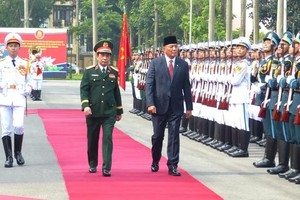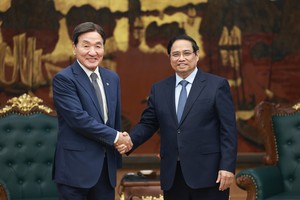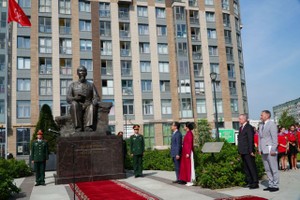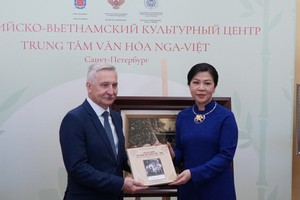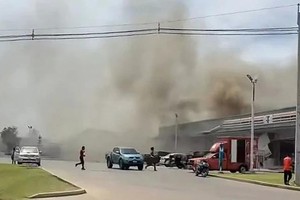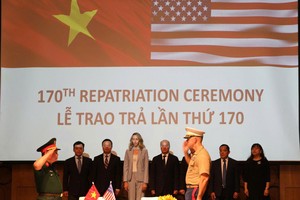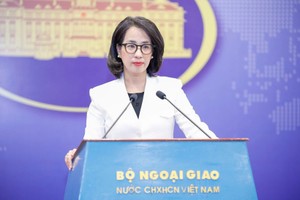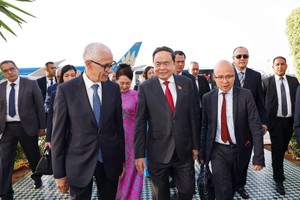The armed wing of Hamas said on Saturday it had fired four Grad rockets at the Israeli town of Ofakim, where officials earlier reported two children had been lightly wounded.
"We fired four Grad rockets at the Zionist town of Ofakim," some 15 kilometres (nine miles) from the Gaza Strip, said a statement from the Ezzedine al-Qassam Brigades.
"This is our response to the crimes of the Zionist occupation after the deaths of 15 of our martyrs and dozens of injured" in Gaza
Egypt decided Saturday to recall its ambassador from Israel to protest the deaths of policemen killed on the border, state television reported, but Israel said it had received no such notification. In the first diplomatic spat between the two nations since the fall of the Mubarak regime, Cairo also demanded a formal apology from Israel and a probe to determine the circumstances of the deadly shootings. The incident occurred during retaliatory attacks on Palestinian militants following the killing of eight Israelis. "Egypt has decided to withdraw its ambassador to Israel until there is an official apology," state television reported. But Israeli foreign ministry spokesman Yigal Palmor said that "at no time has Israel been officially notified of a recall of the Egyptian ambassador." Egyptian officials privately said discussions on the matter were still underway and that no decision had been reached yet. After an overnight crisis meeting, the Egyptian government asked "for an official apology from Israel," state-run MENA news agency said. It repeated its demand to Israel's charges d'affaires, whom it summoned on Saturday afternoon as Israeli Defence Minister Ehud Barak said Israel regretted the policemens' deaths. "Israel regrets the deaths of Egyptian policemen during the attacks on the Egyptian-Israeli border," Barak said, promising a full investigation. After conflicting reports, Information Minister Osama Heykal was quoted by MENA as saying five policemen were killed "inside Egyptian territory as a result of an exchange of fire between Israeli forces and armed elements inside Israeli territory." The violence has triggered anger among Egyptians. Hundreds demonstrated outside the Israeli embassy in Cairo overnight and demanded the expulsion of the Israeli ambassador and denouncing the Jewish state. "Sinai, Sinai," the crowds shouted in reference to the Sinai peninsula where the killings occurred, and "Down with Israel. The people want the ambassador out and the Israeli flag down." On Saturday dozens were still camped outside the building housing the embassy and some torched Israeli flags, an AFP photographer said, as riot and military police stood guard. Prime Minister Essam Sharaf also expressed his anger in a message on his Facebook page. "Egyptian blood is too precious to be spilled for no reason," wrote Sharaf. "Our glorious revolution took place so that Egyptians could regain their dignity at home and abroad. What was tolerated in pre-revolution Egypt will not be in post-revolution Egypt," he said, referring to the ouster of president Hosni Mubarak. Despite a 1979 peace treaty with Israel, many Egyptians still view their neighbour with hostility and there have been calls to revise the peace agreement after a popular revolt ousted Mubarak in February. The military, which took power after Mubarak's overthrow, has said it would honour the treaty. It is the second time that Egypt recalls its ambassador from Israel since the two neighbours made peace. In November 2000 Egypt did so to protest "the excessive use of force by Israel against the Palestinians after the second intifada." Israel's Barak said he ordered the "army to open an investigation" into the killings. "The circumstances of this incident will be examined jointly with the Egyptian army," and the conclusions will be drawn in light of the results of the probe, he said in a statement. He also insisted that the peace treaty signed between Egypt and Israel was "strategic and highly important for stability in the Middle East." A top Israeli defence official stressed meanwhile that peace with Egypt "is a strategic asset" and it would be unthinkable for Israeli personnel to target their Egyptian counterparts. Amos Gilad, head of the defence ministry political department, told Israeli public radio "no soldier would consciously aim his weapon at Egyptian soldiers or policemen." Meanwhile, a monitoring force stationed in the Sinai in keeping with the 1979 peace treaty between Egypt and Israel said Israel violated it when its troops entered Egyptian territory and fired on security personnel, state news agency MENA reported. "The (Multinational Force and Observer) recorded two violations committed by Israel," the agency said, citing an MFO report. "The international forces said in their report on the deaths of Egyptian security personnel that the violations were entering Egyptian territory and firing in the Egyptian side of the border," the agency reported.
